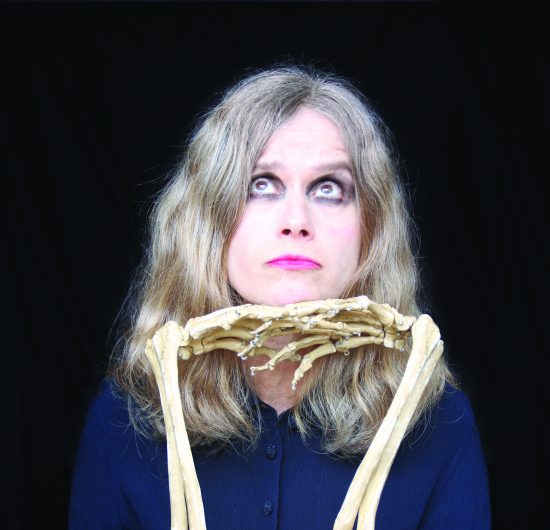
On her new LP, Juana Molina goes dark but reaches for the heavens
It’s a good thing that Argentine artist Juana Molina cut her showbiz teeth acting in humorous ’80s/’90s TV shows like La Noticia Rebelde, El Mundo de Antonio Gasalla and her own starring vehicle, Juana y sus Hermanas. Because the singer—who’s just released her seventh album, Halo, after leaving television behind in 1994—is practically living a real-life sitcom. Her daughter Francisca, now 23, has moved out and wants nothing to do with the family business, which dates back to Molina’s high-profile folks, tango singer Horacio Molina and thespian Chunchuna Villafañe.
“And they were terrible parents,” she says. “They only cared about themselves, so I spent my entire childhood with a nanny and only saw them on weekends.”
But the comedic axis on which Molina’s life revolves is Rosa, her ex-husband’s nanny, who stayed on after their divorce more than a decade ago. “She’s 84 and refuses to leave, even though I’ve told her to leave 100,000 times,” she sighs. “I told her, ‘I can get you a place close to your family,’ and she said, ‘Who cares about my family? My family is you.’ She doesn’t read or write, and she never wanted to learn.” Rosa lost her parents at a young age, so her grandmother put her to work on the family farm. “She was in charge of rabbits and sheep, so she has a completely different idea of the world than we do,” says Molina. “So she’s a very special, different person than you have ever met, but she cooks these delicious meals for me, so it’s a deal.”
The 54-year-old Molina even penned a tune for her housemate called “The Gift,” but it didn’t make the final Halo cut. “It was about all of Rosa’s gifts, and it was silly, like a children’s song,” she says. “Because I think it’s amazing how a person can be like that. And you can’t kick somebody out when it’s someone who really loves you. So we are quite a strange couple.”
And there’s a lot of Rosa’s earthy simplicity—or blissful naivety, even—in the tracks that did make the record, starting with the rubbery, finger-popping rhythm of the opening “Paraguaya,” which gives way to skeletal keyboard tendrils with the faintest bloom of a melody and Spanish-sung lyrics concerning a potion, an invocation and a moon goddess. Molina’s vocals are gentle and whispery, almost conspiratorial, as if they’re a secret she’s confiding. Across eerie, windblown sonic heaths such as “Sin Dones,” (“No Attributes”), “Estalacticas” (“Stalactites”), the spooky “Lentisimo Halo” (“Little Halo”) and a jittery, exuberant “Cosoco,” her dark imagery includes owls, oracles, burnt offerings and poisoned apples.
What was the keyboardist thinking when she conjured these visions? She’s still not sure. But she has a home studio where she could shut herself off from Rosa and any other distractions to experiment with Halo’s hushed tones, which she eventually perfected at Sonic Ranch studio in Texas. Initially, she only had music with murmuring, no lyrics— the words just wouldn’t come.
“I know that people love songs with lyrics,” she says. “But lyrics to me are just an excuse to be able to sing the song, and they have to be disguised in melody. And there are a few songs without lyrics on this record, anyway.” With “Paraguaya,” she adds, she only had the title at first but then came up with doubt as its subject matter: “Then I totally went somewhere else with it, and I wrote about this woman who put a spell on her boyfriend, and I thought that went well with the title.”
Halo was originally intended to be released last October. But Molina—who had whipped up her 1996 debut disc Rara in two rapid-fire weeks—took her time with it, courtesy of inexpensive home recording. “So when I finally wrote lyrics, it was as if they just flowed through the air,” she says. “It was as if I was using a slingshot to hurl stones at a song, and then the song falls to Earth when you have lyrics.”
What did Rosa think of the finished opus, sans “The Gift”?
“She never really says anything about my music,” says Molina. “Although she came to a couple of shows, saw my band and said, ‘Juana! Those were the same guys that came to the house every day, right?’ Whatever she says will have nothing to do with the music!”
—Tom Lanham






